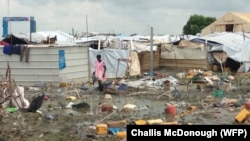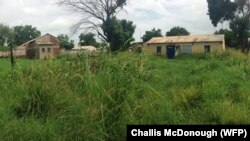"I have never seen conditions like these in my life."
That's how World Food Program (WFP) spokeswoman Challiss McDonough described what she saw when she visited at the U.N. Mission in South Sudan (UNMISS) compound in Malakal last week with WFP Executive Director Ertharin Cousin and UNICEF head Anthony Lake.
Around 17,000 people have sought shelter at the U.N. base in the capital of Upper Nile state that has witnessed some of the worst fighting in South Sudan's seven-month conflict.
There's only activity in a couple of places and this enormous population living in a lake of mud at the U.N. base.Challiss McDonough, WFP Spokeswoman
"People are living on top of each other, and it's the rainy season now," McDonough said. "The place where people are staying has turned into a sea of mud."
During the U.N. officials' visit to the UNMISS camp, "We got caught in a downpour that turned the place into a giant raging river," she said.
From trading hub to ghost-town
Outside the walls of the U.N. compound, the town of Malakal itself has been turned from a bustling trading post on the banks of the White Nile River into a ghost-town, McDonough said.
"Malakal is one of the larger cities in South Sudan, and today it's practically abandoned," she said.
"You see streets that have grown up with tall grasses, shrubs, sorghum but eight months ago, it was a thriving bustling city with many thousands of people living there.
"Now, there's only activity in a couple of places, and this enormous population living in a lake of mud at the U.N. base," McDonough said.
Aid agencies are working as best they can to prevent disease outbreaks at the UNMISS camp, McDonough said.
You see streets that have grown up with tall grasses, shrubs, sorghum. It's completely abandoned.Challiss McDonough, WFP spokeswoman
"But they need additional resources and more space," not just for displaced South Sudanese but also for humanitarian workers, who are living in the same "appalling conditions" as the displaced in the U.N. camp in Malakal.
Government and opposition forces have fought pitched battles for control of Malakal, the capital of South Sudan's largest oil-producing state.
When the fighting first reached the town in late December, tens of thousands of people fled, either to rural areas that they considered safe or to the U.N. compound.
But, since then, "the fighting has spread from the cities to the rural areas where people initially felt safe... and the people have had to move again and again and again," McDonough said.






